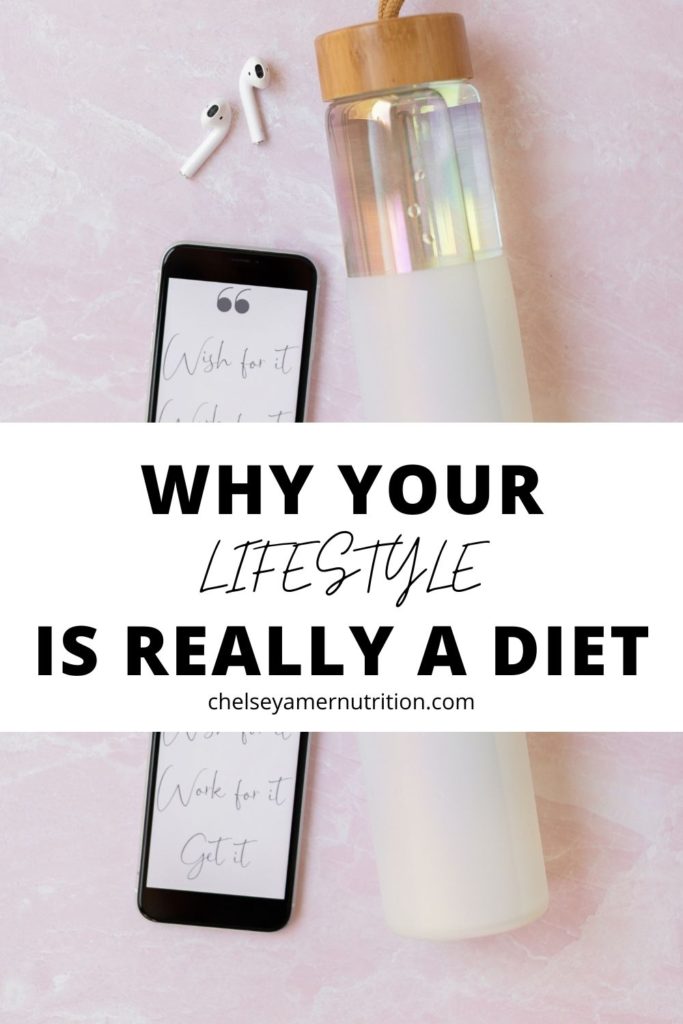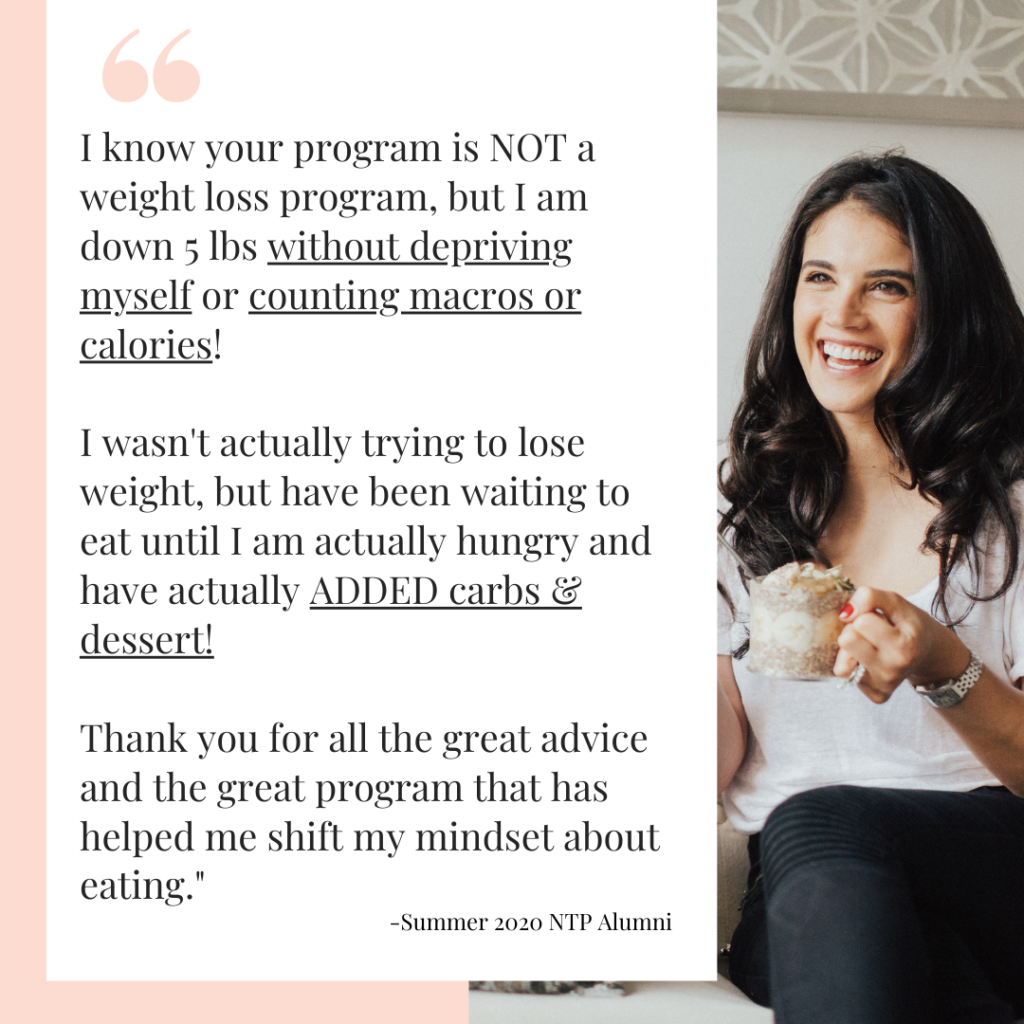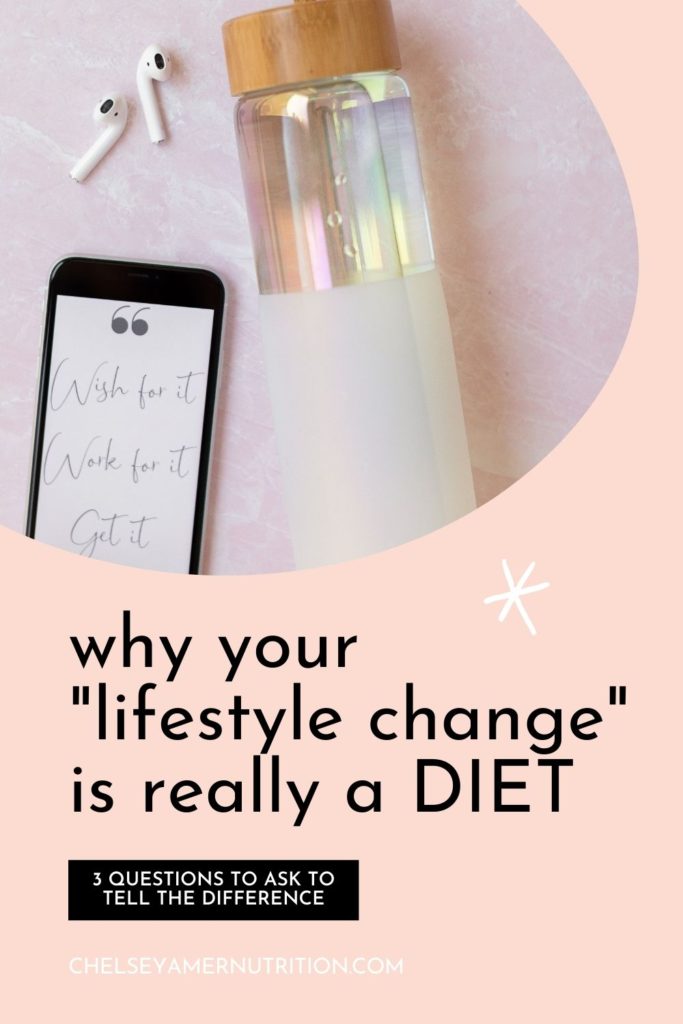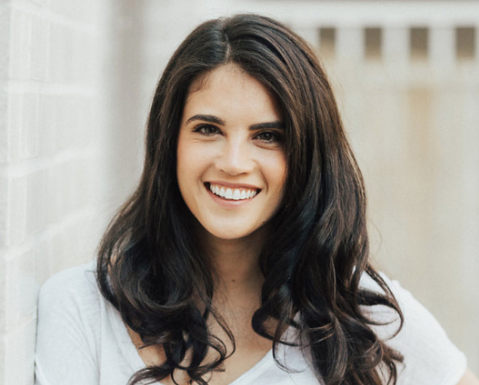Is Your Lifestyle Change Really a Diet?
Is Your Lifestyle Change Really a Diet? Sorry for the bad news, but your lifestyle change is really a diet… Whole30, keto, intermittent fasting… I keep hearing from clients about these “lifestyle changes,” but *newsflash* they’re really restrictive diets that can do more harm than good!
Today I’m breaking down 3 questions you can ask yourself to determine the difference between a diet and a lifestyle change.

Sorry not sorry to be the bearer of bad news, but that “lifestyle change” you’re thinking about come January 1st may actually be ANOTHER RESTRICTIVE DIET you don’t want to start.
The dieting industry has gotten really smart. The word “diet” is now pretty taboo. The multi-billion dollar dieting industry knows that eating as little as possible is no longer in fashion.
So what do they do?
They stop promoting diets and start promoting “healthy lifestyle changes.”
Now, as a registered dietitian I’m ALL FOR healthy lifestyle changes or scientifically-backed behavior changes that are sustainable and help you feel good. After all, a huge component of the work I do with clients and Nutrition Training Program members is help them make these sustainable behavior changes in their own lives.
I WISH more people felt good from the food they eat!
But many of the “healthy lifestyle changes” the dieting industry promotes aren’t sustainable… and that’s the problem.
They’re quick fix diet gimmicks with a new name that makes them socially acceptable.
Case in point – eliminating all grains, beans, and legumes. Sorry, but this is not scientifically supported!
But I get it and I know why these “lifestyle changes” are so appealing…
When you’re constantly on the hamster wheel of diets it’s really hard to get off. You keep trying something new to finally lose those 10 or 20 pounds… and at first it works, so you’re hooked! But eventually, it stops working… so you try something new thinking THIS IS IT (hence the hamster wheel).
You’re especially convinced if your co-worker found success or your BFF did it. If it worked for them, it can work for you.
But that’s not how it works.
Here’s the thing… most of these restrictive diets don’t actually work. They may work for some period of time… but then it becomes too hard.
So what’s a diet?
Technically speaking, a diet is the food you eat.
But in our dieting culture, a diet is a plan you go on that tells you what (and what not) to eat and/or when (or when not) to eat or how much to eat.
Diets tend to have rules…
- “No eating until 12pm” and/or “No eating after 7pm” (aka intermittent fasting)
- “Only 1 starchy carbohydrate per day”
- “No carbs at dinner”
- “No carbs ever” (keto)
- “You can’t eat potatoes, beans, or lentils or peanuts.” (whole30 and paleo)
- “No grains ever!”
Do you see how these statements are strict and have set rules?
Why do diets work for some people?
For some people, yes, these types of set rules really do work. They’re able to follow it for years. And that’s great for those people. If you’re one of those people who wouldn’t mind never eating potatoes, grains, beans, lentils, etc. again, then go for it.
But based on my experience as a dietitian, that’s not most people. Most people can’t live their lives in a full and robust way, being fully present for their relationships, children, partners, friends, and careers, while following strict rules 24/7.
Even more, for many people, these strict rules can lead to disordered eating patterns and behaviors. Maybe someone never had a poor relationship with food before, but now all of a sudden after doing a whole30 they fear white potatoes.
That’s not normal. And PS – white potatoes are CHOCK FULL of nutrients.
What is a real healthy lifestyle change?
A true “healthy lifestyle change” is a behavior that you can adopt for the long-term that’s sustainable.
Here are some examples of healthy lifestyle changes:
- Eating a vegetable with dinner *most* nights
- Drinking a glass of water before your coffee in the morning to boost hydration
- Going for a walk during lunch a few days a week
- Swapping *most* refined white grains for whole grains
- Grilling and roasting food more than frying
These healthy lifestyle changes are doable because they’re not absolutes and they’re not extremes. Notice the words:
- MOST
- FEW DAYS
- MORE THAN
Healthy lifestyle changes focus on healthy behaviors but have FLEXIBILITY.
They’re not absolute or demanding. It’s possible to follow guidelines most of the time, but also live your freakin’ life and enjoy a random pizza night, without worrying about getting out of ketosis (assuming you’re on keto for weight loss purposes only, not for refractory epilepsy, as the diet was originally designed).

Why your lifestyle change is really a restrictive diet
There are a few diets out there that really try to disguise themselves as lifestyle changes, so consumer, beware!!!
Intermittent Fasting
Intermittent fasting has become all the rage because you can eat whatever you want… you just can’t eat during certain windows of the day. I wrote a full primer on IF here, if you want to learn more.
The reason intermittent fasting is really a diet is because there are set rules of when you can and cannot eat. You’re supposed to fight through your hunger.
Hunger is not a badge of honor. Hunger is a physiological symptom of your body needing nourishment.
Instead of intermittent fasting that dictates when you eat, I would encourage you to tune into your hunger and fullness cues and follow them. Eat when you’re hungry, stop when you’re full.
Without the fear that you can’t eat again until tomorrow at noon, you’ll be more likely to eat what your body needs… not overeat until you’re stuffed because you’re worried about not eating again for a while.
Keto
I’m just going to say it – I realllllly hate the keto diet for weight loss. The keto diet was originally designed for children with refractory epilepsy when no other treatment could stop seizures.
The diet industry took over the keto diet and told everyone to eliminate all carbs – including fruit and even some vegetables – for the sake of weight loss.
Essentially, the keto diet is 70% of your calories (or more) from fat, 20-25% from protein and just 5-10% from carbs. This eliminates a lot of fruit, starchy vegetables, beans and lentils, and whole grains.
I know a few people who’ve followed the keto diet for even a year+ now… but research hasn’t shown what all this fat does to your body long term. Plus, when people start freaking out over CARROTS for crying out loud, it’s a bit much!
Plus, by following a keto diet you’re missing out on so many nutrients, like fiber and B vitamins found in healthy whole grains, potatoes and sweet potatoes, winter squashes, beans and lentils and more. This is not good for your gut health… no wonder constipation and bowel concerns RAGE for individuals on the keto diet!
Whole30
Another “lifestyle change” that’s actually a diet. And I think I hate this one most of all because yes, anyone can do anything for 30 days if they want to. Anyone can do a whole30 and be “successful.”
But the damage that following a restrictive plan like the whole30 does for your relationship with food lasts well beyond 30 days.
You may not even realize that you’re fearful of potatoes or beans or peanut butter (even the kind with no sugar). You may not realize that you’ve begun to demonize grains and bread.
These are some of the most nourishing, convenient, and delicious foods out there. Would you still do a whole30 if you knew that you’d feel anxious and guilty every time you ate potatoes – even if they were prepared in a totally “healthy” manner, like roasted with heart-healthy olive oil? I’m not even beginning to touch on french fries!
The mental impact of dieting just isn’t worth it. STRESS does more damage to your health than eating the damn potato!

Dieting poaching season is in full swing as we approach the new year, so here are a few things I want you to keep in mind…
You can focus on your health (right now) and in the new year without starting a diet. You can make small changes to your life to feel good.
You don’t have to wait until the new year to make those changes.
Working with a registered dietitian with a non-diet, healthy approach to eating dietitian can work wonders for you. Pssst – you can enroll in the Nutrition Training Program!
Is your lifestyle change really a diet? Here are 3 questions to ask yourself…
3 Questions To Ask Yourself To Determine If It’s A Diet:
1. Am I eliminating any food groups?
Food groups are protein, carbs, and fat. Right now in 2020, the most popular “lifestyle changes that are really a diet” are eliminating or limiting carbs (think keto, paleo, whole30)
2. Am I restricting when I can eat or listening to my body’s hunger cues?
Any eating plan that interferes with your own intuition is a diet.
3. Can I do this forever?
Forever can be a very long time, so I suggest you think long and hard about this one! Can you skip sharing an ice cream cone when you’re a grandma 30+ years from now and your grandchild wants you to have a lick?
Diet culture is really sneaky, so it’s important to be a detective when it comes to your body and how you treat it. If you ever need help determining if it’s a diet or true lifestyle change that will actually help you, just send me a message!
XO


 Hi there!
Thanks for stopping by! I'm Chelsey, an online Registered Dietitian, recipe developer, budding photographer, and coffee addict! My mission is to help you feel good through food by answering the question "What should I eat?" Let's make nutrition approachable!
I hope you enjoy my personal collection of simple, healthy, food allergy friendly and nutritiously delicious recipes, plus tips and tons of tricks that will help YOU live a nutritionally-balanced life! I look forward to getting to know you better...
Hi there!
Thanks for stopping by! I'm Chelsey, an online Registered Dietitian, recipe developer, budding photographer, and coffee addict! My mission is to help you feel good through food by answering the question "What should I eat?" Let's make nutrition approachable!
I hope you enjoy my personal collection of simple, healthy, food allergy friendly and nutritiously delicious recipes, plus tips and tons of tricks that will help YOU live a nutritionally-balanced life! I look forward to getting to know you better...







